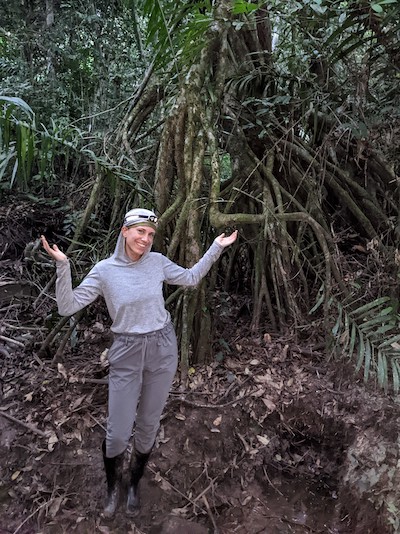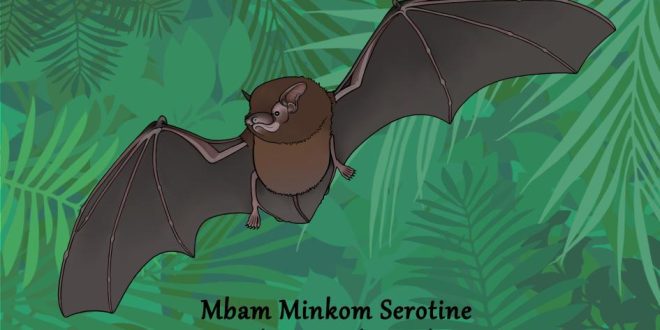Portland State University | Portland State graduate student Amanda Grunwald made an exciting discovery when she returned to campus following a field work trip to Cameroon: she and her collaborators had identified a new species of bat. A research article describing the new species was recently published in the journal Systematics and Biodiversity.
Grunwald, who is a PhD student in biology at PSU, began studying bats while she was an undergraduate at Portland State.
“I had always had an affinity for rodents and while taking classes at PSU discovered my passion for small mammal research,” she says.
During her junior year she studied abroad in Ghana and fell in love with the culture and wildlife. While looking for a way to combine these two, she was accepted into the McNair program and started working on an undergraduate research project studying a small African bat in Cameroon.
With the help of Luis Ruedas, PSU professor of biology, she came up with a proposal and traveled to Cameroon. There, she worked alongside Yvette Nguéagni, a graduate student from Dschang University, and completed a small bat survey.
A few bats from this study were difficult to identify based on physical features. So Grunwald sent samples to Terrence Demos, a research scientist at the Field Museum in Chicago who works on large scale genomic studies of African bats. Demos sequenced the samples in the Pritzker lab at the Field Museum. The results showed that one of the bats was a previously undescribed bat species.
“It was very exciting,” says Grunwald who credits Demos and Bruce Patterson, curator of mammals at the Field Museum, as vital team members in characterizing the new species.
As a graduate student, Grunwald wanted to return to Cameroon to conduct a more comprehensive study on bat diversity. When the grants she applied for didn’t pan out, she started a fundraising campaign to fund her project.
“I ended up raising $15,000,” she says. “I did a community fundraiser and got a bunch of Portland businesses involved. It was really fun to see how many people in Portland are bat lovers like myself.”
This money allowed her to return to Mbam Minkom Massif, an isolated small mountain in central Cameroon. There, Grunwald and collaborators used mist nets to capture bats in the evenings and record data on species present on the mountain and in the surrounding area.
“I felt like insect dinner most of the time. I was more bug bites than I was human at some point,” she says. “It’s really difficult work. You’re camping every night in hot, very wet conditions for long periods of time. And you’re hiking with really heavy equipment through rough conditions.”
But there was another side to fieldwork, too. Grunwald was in the middle of a tropical forest that was home to a diverse array of animals including chameleons, lizards, flying squirrels, primates and more.
“As difficult as it is, it’s equally as magical,” says Grunwald.“The things that are there, they only exist in those environments.”
The research team caught about 220 bats over the course of a month and a half. Some of them were from the genus Pseudoromicia, which was recently described by Grunwald’s collaborator Ara Monadjem, an ecologist at the University of Eswatini.

Grunwald laughs while describing her first discovery. “It’s a little brown bat,” she says. “When I talk to other biologists, every group has a little brown something…we have little brown bats.” Grunwald describes the bat as “simple-looking” in part because it has a simple nose, unlike some other bat species found in the tropics that have elaborate and intricate nose tissue.
“It’s reddish brown and it has brown wings,” she says. ”And it’s teeny. It’s only six grams.”
Grunwald decided on the name Pseudoromicia mbamminkom because it includes the name of the mountain where the specimen was discovered in the local dialect.
“The bat’s home is special and so we wanted to name it something pertinent to the place,” says Grunwald. “The chief and his family that we stayed with were really excited when we told them that we named it Mbam Minkom Serotine because the mountain is a part of their home.”
Now Grunwald is following up on her discovery by looking at how the mountain impacts bat diversity in the area.
Mbam Minkom sits close to Yaoundé, the rapidly expanding capital of Cameroon. Learning more about the biodiversity on Mbam Minkom may support conservation of the mountain and its rivers, forests and wildlife.
“A lot of the surrounding adjacent villages depend on one of the main rivers that flows off of [Mbam Minkom],” says Grunwald. “However it lacks any current protection.”
Collaborating with and supporting Cameroonian researchers has been an important aspect of Grunwald’s research and one that she thinks is vital for conservation efforts. Grunwald made sure the project included scholarships for two Cameroonian graduate students to help them finish their bat studies. She also organized funding for a Cameroonian PhD student, Franck Meyo, to come to the Field Museum in Chicago to do molecular work, a trip that would otherwise be prohibitively expensive.
“In the short time I have been conducting research in Cameroon, it became evident that the current and historical systems in which conservation science are enacted is antithetical to its goals,” says Grunwald. “Colonial science or parachute science is inherently extractive, disregards historical power structures and access to resources, and ultimately recreates the very problems it attempts to solve. However, it’s important to remember that this is the conservation system that we have created and inherited, but it does not define the conservation we want or what conservation will look like moving forward.”
 CameroonOnline.org Cameroon news, Actualité Camerounaise, live Web TV & Radio, World News and a lot more
CameroonOnline.org Cameroon news, Actualité Camerounaise, live Web TV & Radio, World News and a lot more




